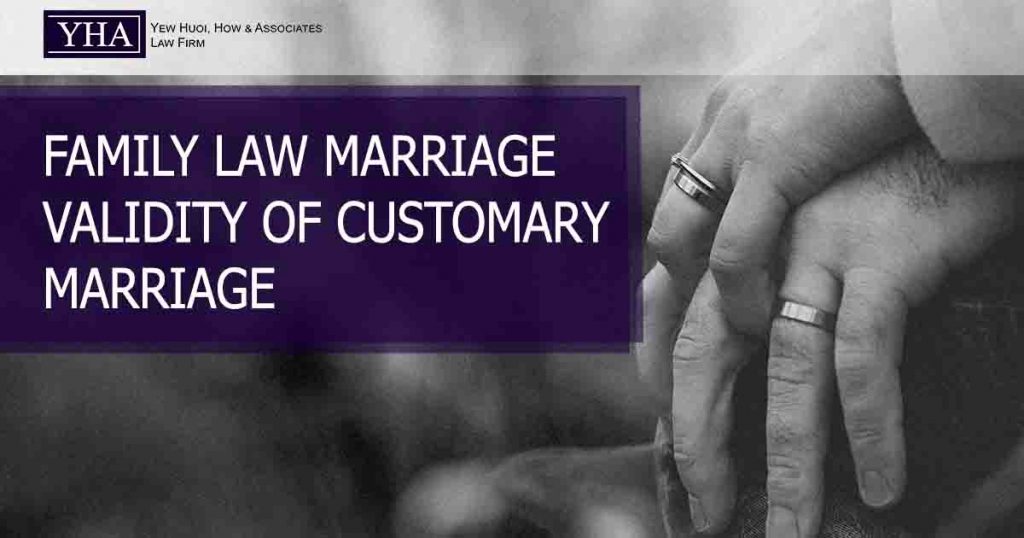In brief
- Malaysia is a multi-racial country with people of many races, faiths, customs, and usages. In family matters, each person is ruled by his or her own set of rules. As a result, the Chinese are subject to Chinese personal law, whereas Hindu law oversees members of the Hindu religion in family matters. Muslim families are governed by Islamic family law. The Law Reform (Marriage and Divorce) Act 1976 (LRA) went into effect in Malaysia on March 1, 1982. The LRA is an Act to provide for monogamous marriages and the solemnization and registration of such marriages; to reform and consolidate the legislation relating to divorce; and to provide for things incidental thereto, according to the lengthy title. Thus, it should be emphasized that the LRA was implemented, among other things, to facilitate the registration of monogamous marriages.
- However, a specific clause in the LRA, Section 34, has created a dilemma regarding whether customary marriages after March 1, 1982, must be registered in order to be recognized by law. Section 34 states the following: “Nothing in this Act or the rules made thereunder shall be construed to render valid or invalid any marriage which otherwise is invalid or valid merely by reason of its having been or not having been registered.”
Whether the marriage solemnization had taken place?
- The LRA became legislation on March 1, 1982, and requires all marriages to be registered in order to be considered lawful. As a result, any marriage that is not registered, such as one between a girlfriend and a boyfriend or cohabitants, is considered invalid and provides no protection under family law.
- Having said that, all marriages that were not registered but were solemnized under any law, religion, or customary rites prior to March 1, 1982 are still legal marriages and thus valid as long as parties can show proof of solemnization of their marriage, such as certification, eyewitnesses, or, even better, video recording.
Customary Marriages Prior to the LRA
- Prior to the implementation of the LRA, customary weddings were not required to be registered. Before establishing whether a customary marriage was solemnized in accordance with the applicable religion, tradition, or usage, courts must look through the evidence presented by feuding parties. This section will look at two types of customary marriages in Malaysia: Chinese customary marriages and Hindu marriages.
a) Chinese Customary Marriages
- The learned court has put out two factors essential to create a legitimate Chinese marriage in the case of In the Estate of Yeow Kian Kee; Er Gek Cheng v Ho Ying Seng, the first being a consenting marriage, and the second being that the marriage must be one of indefinite length.
b) Hindu Customary Marriages
- In Ramasamy v. PP10, the appellant was charged with enticing a married woman under section 498 of the Penal Code. One of the arguments advanced by the appellant’s lawyer was that there was insufficient proof of the marriage between the purported seduced lady and the complainant. In order to determine whether a genuine Hindu marriage had occurred, the court in the aforesaid case focused on two factors: first, proof of the actual ceremony, and second, expert testimony to prove that the event constituted a lawful marriage.
Customary Marriages from 1 March 1982
- Generally, non-Muslims must marry in conformity with Part III of the LRA starting on March 1, 1982, or their marriages would be declared null and invalid. Section 5(4) emphasizes this even more by stating that beyond the specified day, no marriage may be solemnized by any law, religion, custom, or usage save as allowed in Part III.
- In Venajo Rajoo v R. Ravindran Ramasamy, for example, the judge had to assess whether the plaintiff and defendant were legally married. The learned judge cited section 34 of the LRA and found that the customary marriage solemnized between the plaintiff and the defendant was legal under that clause. Because it was not registered, it should not be considered void.
- In summarizing the LRA’s goals for solemnizing religious or customary weddings, the court determined that solemnization can only take place if two criteria are met. To begin, the person solemnizing the marriage, whether a religious official from a church or temple or anybody else, must have been authorized as an assistant registrar by the Minister. Secondly, there must have been delivered to the assistant registrar a statutory declaration either under section 24(1) or if marriage is not a religious ceremony, under section 22(3).

